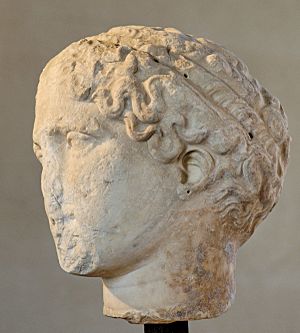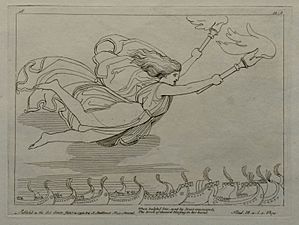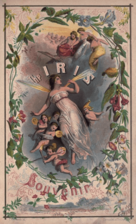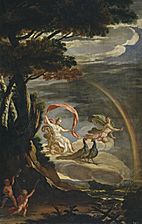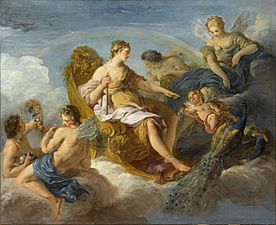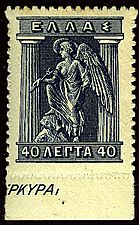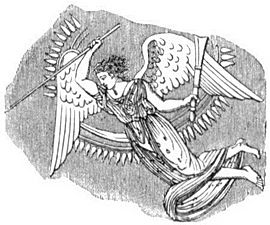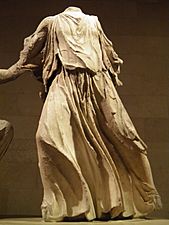Iris (mythology) facts for kids
Quick facts for kids Iris |
|
|---|---|
| Goddess of the Rainbow | |
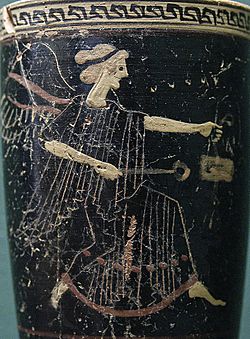
Iris, Attic lekythos in Six's technique (superposed colours), circa 500–490 BC, found in Tanagra, now in Louvre.
|
|
| Abode | Mount Olympus (possibly) |
| Symbol | Rainbow, caduceus, pitcher (container) |
| Personal information | |
| Consort | Zephyrus |
| Offspring | Pothos |
| Parents | Thaumas and Electra |
| Siblings | Arke, Harpies, Hydaspes |
In ancient Greek religion and mythology, Iris (EYE-riss) is a special goddess. She is the daughter of the gods Thaumas and Electra. Iris is the personification of the rainbow, meaning she is the rainbow itself.
She is also a messenger for the gods, especially for Queen Hera. Iris appears in many stories, carrying important messages between gods or running errands for them. She doesn't have many myths just about herself. In ancient art, Iris is shown as a young woman with wings. She often carries a caduceus, which is a symbol for messengers, and a pitcher of water for the gods. Iris is often seen as the partner of Zephyrus, the god of the west wind. In some stories, they are the parents of Pothos.
Contents
Iris's Family and Powers
According to an ancient poem called the Theogony by Hesiod, Iris is the daughter of Thaumas and the Oceanid Electra. She is also the sister of the Harpies, who were mythical winged creatures. Her sisters include Arke and Ocypete.
Iris is known as the goddess of the rainbow. She also serves nectar, the drink of the gods, to the goddesses and gods. Her partner is Zephyrus, the god of the west wind. Together, they had a son named Pothos. Some stories also say they were the parents of Eros, the god of love. However, Eros is usually said to be the son of Ares and Aphrodite. Iris's brother is Hydaspes.
Iris is also seen as one of the goddesses of the sea and the sky. She connects the gods to humans. She can travel as fast as the wind, going from one end of the world to the other. She can even go deep into the sea and the underworld.
Iris in Greek Myths
The War of the Gods
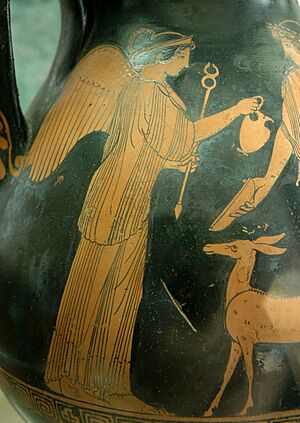
Iris is said to travel on the rainbow as she carries messages from the gods to people. In some stories, Iris had a sister named Arke. Arke was also a messenger goddess. During the Titanomachy, a great war between the Olympian gods and the Titans, Arke joined the Titans. This made the two sisters enemy messengers.
After Zeus and his allies won the war, Zeus took Arke's wings. He later gave them as a gift to Thetis, a sea nymph, at her wedding. Thetis then gave the wings to her son, Achilles. Achilles wore them on his feet, which made him very fast. This is why Achilles was sometimes called podarkes, meaning "feet like Arke's wings."
Messenger of the Gods
Iris often carried important messages for the gods. For example, when Persephone was taken by Hades, her mother Demeter was very sad. Demeter, the goddess of farming, made the earth barren. This caused a terrible famine. Zeus sent Iris to Demeter to ask her to lift the curse. But Demeter would not agree until her daughter was returned.
In another story, Leto and her children asked Zeus to free Prometheus from his suffering. Zeus agreed and sent Iris to tell Heracles to free Prometheus.
After Ceyx drowned in a shipwreck, Hera sent Iris to Hypnos, the god of sleep. Iris found Hypnos in his cave. She told him that Hera wanted Ceyx's wife, Alcyone, to learn about her husband's death in her dreams. Iris left quickly because Hypnos's powers made her feel dizzy and sleepy.
In a funny play called The Birds by Aristophanes, the birds build a city in the sky. They plan to take over from the Olympian gods. Iris, as the messenger, goes to meet them. But the birds' leader, Pisetaerus, makes fun of her and threatens her. Iris is confused that he doesn't know who the gods are. Pisetaerus tells her that the birds are the new gods. Iris scolds him for his rude words and leaves. She warns him that Zeus will punish him.
Iris also appears in Virgil's poem Aeneid. She often acts for Juno, the Roman version of Hera. In one part, Juno sends Iris to take a lock of hair from Queen Dido. This allows Dido to die and go to the underworld. In another part, Iris pretends to be a Trojan woman. She encourages other Trojan mothers to burn some of Aeneas's ships. This was to stop them from leaving Sicily.
According to the Roman poet Ovid, Romulus became a god named Quirinus. His wife, Hersilia, asked the gods to make her immortal too so she could be with him. Juno heard her prayer and sent Iris. Iris touched Hersilia with her finger, and Hersilia became an immortal goddess. She flew to Olympus and became one of the Horae, living with her husband forever.
The Trojan War
Iris is often mentioned as a divine messenger in The Iliad, a famous poem by Homer. She does not appear in The Odyssey, where Hermes takes her role. Like Hermes, Iris carries a caduceus or a winged staff. By Zeus's command, she carries a pitcher of water from the River Styx. She uses this water to make anyone who lies fall asleep.
In one part of The Iliad, Iris delivers Achilles's prayer to the wind gods to light the funeral fire for Patroclus. In the last part, Zeus sends Iris to King Priam. She tells him to go alone to the Greek camp and get his son Hector's body from Achilles. Iris quickly delivers the message and returns to Olympus.
Other Important Stories
In the "Homeric Hymn to Apollo", Leto was about to give birth to Apollo and Artemis. All the goddesses were there except Hera and Eileithyia, the goddess of childbirth. Leto told Iris to secretly ask Eileithyia for help. According to another writer, Callimachus, Iris and Ares were ordered by Hera to tell all cities not to give shelter to pregnant Leto. But the island of Delos helped Leto. Iris then flew back to Hera to tell her that Leto had given birth.
According to Apollonius Rhodius, Iris stopped the Argonauts Zetes and Calais. They were chasing the Harpies. The brothers had saved the prophet Phineus from the Harpies. Iris asked them not to kill the Harpies, promising that Phineus would not be bothered again.
After King Creon of Thebes said that dead soldiers could not be buried, Hera ordered Iris to put dew and ambrosia on their bodies.
In a play by Euripides called Heracles Gone Mad, Iris appears with Lyssa, the goddess of madness. They curse Heracles with madness, causing him to kill his sons and wife. Iris also prepared the bed for Zeus and Hera.
How Iris Was Worshipped
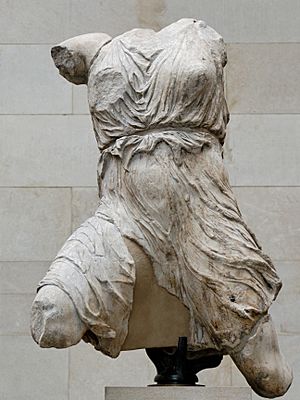
Unlike Hermes, another messenger god, Iris was not widely worshipped in ancient Greece. There are no known temples or special places built just for her. She was often shown on vases and in art, but not many statues of her have been found. However, she was part of the sculptures on the west pediment of the Parthenon in Athens.
There is a small amount of evidence that people did worship Iris. A writer named Athenaeus mentioned that the people of Delos offered cheesecakes called basyniae to Iris. These cakes were made of wheat flour, fat, and honey.
Special Names for Iris
Iris had many poetic names, also called epithets. These include:
- chrysopteros (meaning "golden winged")
- podas ōkea (meaning "swift footed")
- podēnemos ōkea (meaning "wind-swift footed")
- roscida (Latin for "dewy")
- Thaumantias or Thaumantis (meaning "Daughter of Thaumas" or "Wondrous One")
- aellopus (meaning "storm-footed" or "storm-swift")
She was also believed to water the clouds with her pitcher, getting the water from the sea.
How Iris is Shown
Iris is shown either as a rainbow or as a beautiful young woman with wings on her shoulders. As a goddess, Iris is connected to communication, messages, the rainbow, and new beginnings. This idea of her being a rainbow was once described as a link between the heavens and earth.
In some stories, she wears a coat with many colors. This coat helps her create the rainbows she rides to travel from place to place. Iris's wings were said to be so beautiful that they could even light up a dark cave. This is seen in the story where she visits Somnus (Hypnos) to give a message to Alcyone.
While Iris was mainly linked to messages, people also believed she helped answer human prayers. She would either answer them herself or bring them to the attention of other gods.
Iris in Science
- The plant iris was named after her. This is because its flowers come in many different colors, like a rainbow.
- 7 Iris is a main-belt asteroid named after this goddess.
- The chemical element iridium was named after Iris. This is because its salts create many colorful compounds.
Gallery
- Iris in art
-
Iris sent by Jove in the Iliad (engraving by Tommaso Piroli after John Flaxman)
-
Alegoría del Aire by Antonio Palomino (circa 1700)
-
Juno, Iris and Flora by François Lemoyne
See also
 In Spanish: Iris (mitología) para niños
In Spanish: Iris (mitología) para niños
 | Dorothy Vaughan |
 | Charles Henry Turner |
 | Hildrus Poindexter |
 | Henry Cecil McBay |


